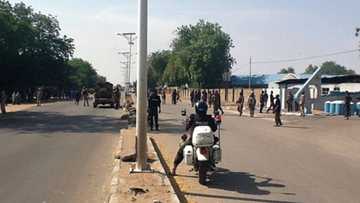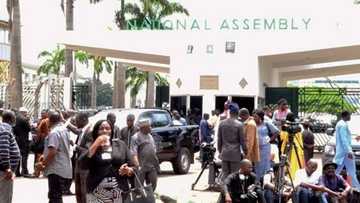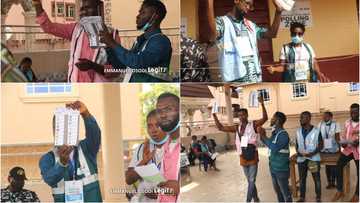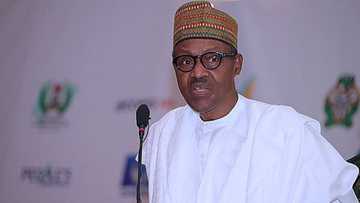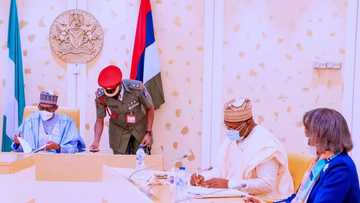2023 Polls: IPC, EU, Release Safety, Professional Advisory for 10,000 Journalists Covering Election
- The presidential election is 24 hours around the corner, and the tension and anxiety are currently high
- Journalists have been told to exhibit professionalism and absolute caution during and after the election
- The International Press Centre (IPC) and European Union (EU) released an advisory for journalists to follow during the election period
PAY ATTENTION: See you at Legit.ng Media Literacy Webinar! Register for free now!
FCT, Abuja - The International Press Centre (IPC), in partnership with the European Union (EU), has rolled out professional and safety advisory for journalists ahead of the 2023 polls.
The advisory was rolled out by the executive director of IPC, Lanre Arogundade, in Abuja on Thursday, February 23, at the Transcorp Hilton.

Source: Facebook
According to Arogundade, at least 10,000 across the 36 states have been accredited by the Independent National Electoral Commission (INEC).
He said:
PAY ATTENTION: Subscribe to Digital Talk newsletter to receive must-know business stories and succeed BIG!
"Based on figures from the Independent National Electoral Commission (INEC), about 10,000 journalists and other media professionals from about 500 local and international media outlets or news mediums have been accredited to cover Nigeria's general elections in all the 36 States and the FCT, Abuja, beginning with the presidential polls on Saturday, February 25, 2023."
He stated the objective of the advisory was to promote the personal safety of journalists covering the 2023 general elections, ensuring professionalism and complementing national and international standards for reporting electoral processes and elections.
According to the advisory document made available to Legit.ng, below are the professional and security tips for journalists during the 2023 general election season.
1. Safety Measures
a. Before Election Day
Be prepared: Accredited journalists should anticipate risks and find out as much as they can about the terrain they will cover on election day, especially the security situation. This will help them to put in place risk mitigation measures.
Don’t ignore signals: Accredited journalists should factor early warning signals of threat to election security or possible violence into their preparation. In this regard, they should carefully study the reports of the law enforcement and security agencies and civil society organisations working on election security.
Mind your health: Accredited journalists should prior to election day create time for basic medical check-up. Those with underlying health conditions are advised to confide in their management who will determine the best way they can be deployed, if at all they would, on election day.
Have means of identification ready: All accredited journalists should make sure to collect their accreditation tags from INEC offices in the states where they would be on election duty.
Arm yourself with contacts: Accredited journalists should obtain the contact details of the national secretariat and state chapters of the Nigeria Union of Journalists (NUJ) and other umbrella media professional bodies/associations; the Police commissioners and spokespersons of the State Police Commands and the INEC resident electoral commissioners in the states they will be covering the elections for necessary contact in case of attacks/threats or emergency.
b. On Election Day
Be sure to be fit: Accredited journalists on medications must ensure they take them as necessary and generally do last-minute check-up before setting out.
Dress smart: Accredited journalists should ensure they are smartly dressed to make walking or running easy should occasion demand such.
Make identification easy: Accredited journalists should don their INEC accreditation tags and additionally have on them their organisational or professional body identity cards for easy identification should the law enforcement security and security agents require such.
Take care of your communication gadgets: Accredited journalists should make sure their phones are fully charged and loaded with sufficient credit and data to avoid sudden disruption in communication especially in moments of emergency.
Be brave and smart: Accredited journalists should make sure they cover from reasonable distance to make retreat possible if the situation gets rough, there is mob action and violence occurs.
Do not walk or move alone: Accredited journalists should as much as possible move in groups or in clusters. It is much easier to attack a person than a group of persons.
Be non-partisan: Accredited journalists should not don any insignia of the political parties or get distracted from their professional responsibility by exhibiting bias in favour of any political party or getting caught in partisan public discussion.
Maintain integrity: Accredited journalists should not negotiate with any politician to suppress the news or collect bribes to publish stories. These may come to hunt you.
Never lose touch: Accredited journalists should constantly be in touch with close relatives and friends and create a safety alert response that allows immediate contact with them in case of attacks/threats.
Have a good plan: Accredited journalists should try to stick to their planned route if driving or being driven, avoid travelling at night and generally stay in regular touch with their news desk or other colleagues.
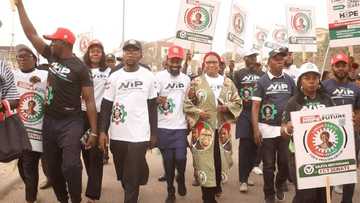
Read also
2023: Peter Obi’s supporters storm INEC headquarters in Abuja, make huge demand from chairman, officials
Don’t announce un-authorised or fake results: Accredited journalists should refrain from declaring a candidate or candidates winners before the election management body – INEC - does so. This indeed is an offence under the Electoral Act 2022.
Do not be silent: Accredited journalists should not keep silent but promptly report any suspicious movement around them, threats or attacks.
2. Ethics and Professionalism
The Nigerian Media Code of Election Coverage describes journalists as “the key purveyor of information on the electoral processes”, which makes it imperative for them to adopt best professional and ethical standards and imbibe the principles of conflict-sensitive journalism in the reporting of the general elections. To this end, all journalists and other media professionals on election duty should:
a. Report the elections in a fair and balanced manner.
b. Report only factual electoral information.
c. Verify any allegation made against a party, candidate or any other interest before publishing while reflecting as many sides to the dispute as possible.
d. Report the views of candidates and political parties directly and in their own words, while exercising necessary professional discretion, rather than as they are interpreted by others.
e. Not solicit or accept bribes or make other pecuniary demands from parties and candidates to publish or suppress reports.
f. Not use or display any insignia of candidates and parties in the course of professional duty.
g. Verify the facts and information contained in press releases and media briefings.
h. Avoid the publication of fake news and instantly identify any fake news in circulation; and refrain from disseminating misinformation or disinformation.
Source: Legit.ng

